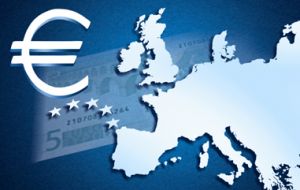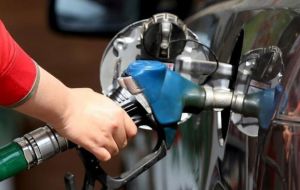MercoPress. South Atlantic News Agency
Euro zone economy expands faster than expected in the first quarter
 Separate data from Eurostat also indicated that deflation had returned to the Euro zone. Inflation in the bloc fell to minus 0.2% in April, down from zero in March.
Separate data from Eurostat also indicated that deflation had returned to the Euro zone. Inflation in the bloc fell to minus 0.2% in April, down from zero in March.  Other Eurostat figures showed the Euro-zone's unemployment rate fell to 10.2% in March, the lowest rate for four-and-a-half years.
Other Eurostat figures showed the Euro-zone's unemployment rate fell to 10.2% in March, the lowest rate for four-and-a-half years.  The Euro-zone has recently benefited from a fall in oil prices and the euro, particularly in Germany.
The Euro-zone has recently benefited from a fall in oil prices and the euro, particularly in Germany. The Euro-zone's economy grew by a faster-than-expected 0.6% in the first three months of the year, according to official statistics. The growth rate in the 19-nation bloc doubled from the 0.3% rate recorded in the previous quarter, and was above analysts' expectations of 0.4%.
However, separate data from Eurostat also indicated that deflation had returned to the Euro zone. Inflation in the bloc fell to minus 0.2% in April, down from zero in March.
Other Eurostat figures showed the Euro-zone's unemployment rate fell to 10.2% in March, the lowest rate for four-and-a-half years.
The latest growth figures suggest that the Euro-zone's economy is now bigger than it was before the start of the financial crisis eight years ago.
The Euro-zone has recently benefited from a fall in oil prices and the euro, particularly in Germany. Looser budgetary policies by government have also freed up resources in some of the region's debt-laden economies.
The inflation figures showed that energy prices fell 8.6% year-on-year in April, while unprocessed food prices rose 1.2%. Stripping out those items, the core inflation rate showed consumer prices rose 0.8% year-on-year in April - less than a 1% increase in March.
The European Central Bank's target is to keep the headline inflation close to, but below, 2%. In March, the ECB cut interest rates further and expanded its bond-buying stimulus program in an attempt to drive growth in the Euro-zone and push up inflation.




Top Comments
Disclaimer & comment rules-

-

-

Read all commentsThat's a rounding error.
May 03rd, 2016 - 12:38 pm 0According to the experts,
May 03rd, 2016 - 07:06 pm 0Euro zone economy expands faster and faster and faster,
and by the referendum it will be at super sonic speeds,
according to the experts.
“according to official statistics”
May 04th, 2016 - 08:01 pm 0They haven't had their accounts signed off for fifteen years because they are riddled with errors and downright theft and they want us to believe this nonsense.
VOTE LEAVE!
Commenting for this story is now closed.
If you have a Facebook account, become a fan and comment on our Facebook Page!